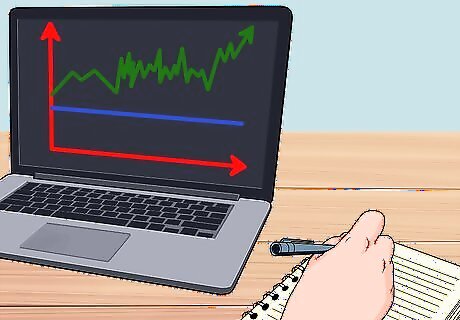
views
Getting Into the Capitalist Mindset

Understand the difference between capitalism and capitalists. Capitalism is a political philosophy that advocates for free markets, free of government intervention, and believes in the self-regulating power of the market. A capitalist may or not share these political views, but instead simply is one who invests capital in business interests. That is, a capitalist can believe in socialism or communism, or any other political or economic system, while still taking advantage of the free market to further their own interests.

Believe in yourself. Capitalism allows anyone with an amount of capital, no matter how small, to grow that capital and improve their position in life. Anyone can escape from a life of dependence on wages and start making their money work for them. In order to make your business ideas come to fruition, you'll have to believe in the capitalist system and in yourself.

Think of yourself as a company. Being a capitalist requires a fundamental change in the way that you think about yourself. Instead of thinking of yourself as part of a business or the owner of one, think of yourself as the business. Use the assets available to you, including both physical assets and your skills and expertise, to produce income in the most efficient way possible. Grow your own personal value and net worth by investing in yourself, such as in education and networking. Build a personal brand and work to gain brand recognition for yourself. Reduce your own debts and try to build your assets over time. By shifting how you view yourself, you can turn around your finances and begin to grow your wealth.

Know the benefits of capital investment. Capital investment frees you from dependence on wages and can earn money with less effort on your part. By putting your money into appreciating (growing) assets, you are not just earning money to spend but instead creating a cycle of growth. In this cycle, you earn money from working on your business or holding your assets and reinvest that earned money to grow the value of your business or assets. Any work you do is not just for wages, but also to increase the value of your assets.

Be open to opportunities. Be alert to new business opportunities and be willing to try them out. Even if your primary area of expertise is in one area, don't lock yourself into that one field. Instead, branch out into new areas where possible, especially if you think they will be very profitable. This will not only increase your income, but also protect you from market fluctuations.
Acquiring Capital

Save your money. In order to be a capitalist, you will need some capital to invest. You don't need a lot of it, but you will need something to get started. If you weren't lucky enough to be born with money, you can still work diligently to save your income and earn enough money to invest it in capital. Quite simply, you need to carefully watch your income and expenses, making sure that you're saving as much as possible. Try setting a goal and making a budget to help you reach that goal in a set amount of time.]

Cut down your taxes. A capitalist knows that paying their tax burden and staying within the bounds of the law is a necessary civic duty. However, this doesn't mean that you should just accept your tax burden as is. Instead, always be on the lookout for ways to reduce your taxable income and taxes owed. Reductions can be made using tax credits or deductions, expensing everything you possibly can, and, for businesses, capitalizing assets over several years.

Buy securities. One of the easiest ways you can begin using your capital to earn more is by investing in securities, like stocks, bonds, and mutual funds. These assets have the ability to appreciate in value or return a steady income to you, depending on the nature of the security. Get started by researching each type of asset and determining where your money can earn the most for you. For more, see how to choose stocks.

Invest in capital assets. Capital assets are those assets, for instance a piece of production equipment or a commercial vehicle, that can be used to produce income. Owning these assets is the foundation of being a capitalist: you use them to earn income and then use the income to purchase more of them. Typically, these assets require a large initial investment. However, you can use various types of financing to reduce the immediate cost to you down to a very low amount, or in some cases nothing. For more information, see how to start your own business without money and how to buy a business with no money.

Create value. In the twenty-first century, the definition of capital has been expanded to include a lot of abstract ideas and intangible values. You can create value by simply coming up with a good idea and convincing others of the value of that idea without actually putting in or earning any money. Think of companies like Snapchat or Facebook that created a tremendous amount of value without earning any money for a long period of time. They started with a good idea then worked to perfect that idea, eventually earning billions of dollars from the effort. Think about ideas that could create social, cultural, or human capital. Maybe consider ways to improve people's well-being or productivity. Take advantage of the far-reaching powers of the internet to spread your idea and get people behind it. As your idea develops, work towards turning it into a capital-producing business..
Growing Your Capital

Grow your business. If your primary business operations are up and running, you may want to look into growth options. In addition to increasing profitability and sales volume in your primary operations, you can expand to new areas, create and market new products, or look to attract a new type of customer.

Add income streams. Look for areas outside of your primary business operations where you can make money. Maybe you can teach a skill in your spare time, or write a guide to help others do something that you know how to do. Adding to your personal income streams can give you an extra cushion in case your primary business goes south. It can also provide you with additional money to reinvest in assets.

Watch the market. Always be on the lookout for the changing moods of your customers and trends in the market at large. Make changes to your way of doing business if they become outdated. Constantly seek out new ways to increase your profitability, diversify, take advantage of new technology, or reach new market segments. Read up on business developments in newspaper or magazines specific to your industry.



















Comments
0 comment